
NYSE American, formerly known as the American Stock Exchange (AMEX), and more recently as NYSE MKT, is an American stock exchange situated in New York City. AMEX was previously a mutual organization, owned by its members. Until 1953, it was known as the New York Curb Exchange.

The New York Stock Exchange is an American stock exchange in the Financial District of Lower Manhattan in New York City. It is the largest stock exchange in the world by market capitalization.
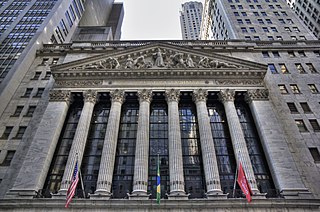
A stock exchange, securities exchange, or bourse is an exchange where stockbrokers and traders can buy and sell securities, such as shares of stock, bonds and other financial instruments. Stock exchanges may also provide facilities for the issue and redemption of such securities and instruments and capital events including the payment of income and dividends. Securities traded on a stock exchange include stock issued by listed companies, unit trusts, derivatives, pooled investment products and bonds. Stock exchanges often function as "continuous auction" markets with buyers and sellers consummating transactions via open outcry at a central location such as the floor of the exchange or by using an electronic trading platform.

London Stock Exchange (LSE) is a stock exchange in the City of London, England, United Kingdom. As of August 2023, the total market value of all companies trading on the LSE stood at $3.18 trillion. Its current premises are situated in Paternoster Square close to St Paul's Cathedral in the City of London. Since 2007, it has been part of the London Stock Exchange Group. The LSE is the most-valued stock exchange in Europe as of 2023. According to the 2020 Office for National Statistics report, approximately 12% of UK-resident individuals reported having investments in stocks and shares. According to the 2020 Financial Conduct Authority (FCA) report, approximately 15% of UK adults reported having investments in stocks and shares.

The Boston Stock Exchange was a regional stock exchange formerly located in Boston, Massachusetts. It was founded in 1834, making it the third-oldest stock exchange in the United States. On October 2, 2007, NASDAQ agreed to acquire BSE for $61 million.
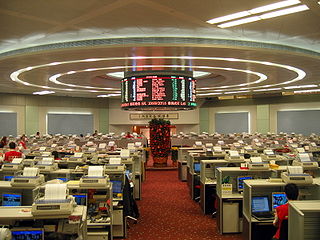
The Stock Exchange of Hong Kong is a stock exchange based in Hong Kong. As of the end of 2020, it had 2,538 listed companies with a combined market capitalization of HK$47 trillion. It is reported as the fastest growing stock exchange in Asia.
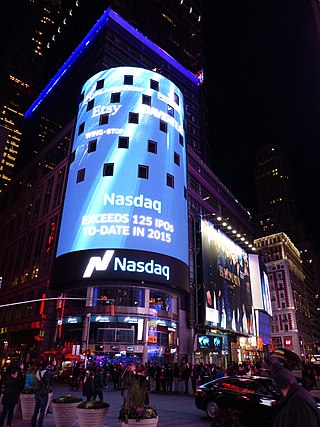
Nasdaq, Inc. is an American multinational financial services corporation that owns and operates three stock exchanges in the United States: the namesake Nasdaq stock exchange, the Philadelphia Stock Exchange, and the Boston Stock Exchange, and seven European stock exchanges: Nasdaq Copenhagen, Nasdaq Helsinki, Nasdaq Iceland, Nasdaq Riga, Nasdaq Stockholm, Nasdaq Tallinn, and Nasdaq Vilnius. It is headquartered in New York City, and its president and chief executive officer is Adena Friedman.

Budapest Stock Exchange(BSE) (Hungarian: Budapesti Értéktőzsde (BÉT)) is the 2nd largest stock exchange in Central and Eastern Europe by market capitalization and liquidity. It is located at 55 Krisztina Boulevard, Budapest, Hungary, in the Buda Centre of the Hungarian National Bank Previously, from 1864, during the Austro-Hungarian Empire it was located in the Budapest Stock Exchange Palace building, until a large trading floor was necessary. The exchange is controlled by listed issuers, by Hungarian private investors and by the central bank. The BSE is member of the World Federation of Exchanges and the Federation of European Securities Exchanges.

Broad Street is a north–south street in the Financial District of Lower Manhattan in New York City. Originally the Broad Canal in New Amsterdam, it stretches from today's South Street to Wall Street.
A regional stock exchange is a term used in the United States to describe stock exchanges that operate outside of the country's main financial center in New York City. A regional stock exchange operates in the trading of listed and over-the-counter (OTC) equities under the SEC's Unlisted Trading Privileges (UTP) rule.

The Merchants' Exchange Building is an historic building which is located on the triangular site bounded by Dock, 3rd and Walnut Streets in the Old City neighborhood of Philadelphia, Pennsylvania. It was designed by architect William Strickland, in the Greek Revival style, the first national American architectural style and built between 1832 and 1834. It operated as a brokerage house in the nineteenth century, but by 1875 the Philadelphia Stock Exchange had taken the place of the Merchants' Exchange.

Cira Centre South is a complex of two skyscrapers in the University City district of Philadelphia, Pennsylvania, directly across the Schuylkill River from Center City, Philadelphia. The complex is between Walnut Street and Chestnut Street south of 30th Street Station and the Old Post Office Building.
An exchange, bourse, trading exchange or trading venue is an organized market where (especially) tradable securities, commodities, foreign exchange, futures, and options contracts are bought and sold.
The Edinburgh Stock Exchange was established in 1844. Not to be confused with the Edinburgh Royal Exchange.
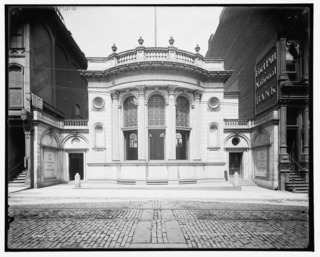
The Pittsburgh Stock Exchange was a large regional stock market located in Pittsburgh, Pennsylvania from November 11, 1864 until closing on August 23, 1974. It was alternatively named the Pittsburgh Coal Exchange starting on May 27, 1870, and the Pittsburgh Oil Exchange on July 21, 1878 with 180 members. On July 25, 1896 the Exchange formally took the name Pittsburgh Stock Exchange though it had been referred to by that name since the spring of 1894. The Exchange, like many modern day exchanges, was forced to close during sharp economic crashes or crises. On December 24, 1969 The Philadelphia-Baltimore-Washington Stock Exchange bought the Pittsburgh Stock Exchange. At its height the exchange traded over 1,200 companies, but by the last trading day in 1974 only Pittsburgh Brewing Company, Williams & Company and Westinghouse remained listed.

The American Stock Exchange Building, formerly known as the New York Curb Exchange Building and also known as 86 Trinity Place or 123 Greenwich Street, is the former headquarters of the American Stock Exchange. Designed in two sections by Starrett & van Vleck, it is located between Greenwich Street and Trinity Place in the Financial District of Lower Manhattan in New York City, with its main entrance at Trinity Place. The building represents a link to the historical practices of stock trading outside the strictures of the New York Stock Exchange (NYSE), which took place outdoors "on the curb" prior to the construction of the structure.

Interactive Brokers LLC (IB) is an American multinational brokerage firm. It operates the largest electronic trading platform in the United States by number of daily average revenue trades. The company brokers stocks, options, futures, EFPs, futures options, forex, bonds, funds, and some cryptocurrencies.
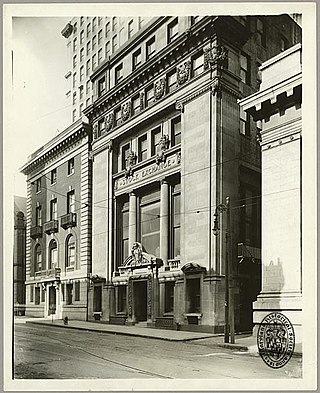
The Baltimore Stock Exchange was a regional stock exchange based in Baltimore, Maryland. Opened prior to 1881, The exchange's building was destroyed by the Great Baltimore Fire of 1904, and was then located at 210 East Redwood Street in Baltimore's old financial district. In 1918, the exchange had 87 members, with six or seven members at the time serving the United States in World War I. The Baltimore Stock Exchange was acquired by the Philadelphia Stock Exchange in 1949, becoming the Philadelphia-Baltimore Stock Exchange. The Baltimore Stock Exchange Building was sold and renamed the Totman Building.





















